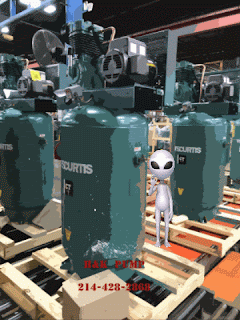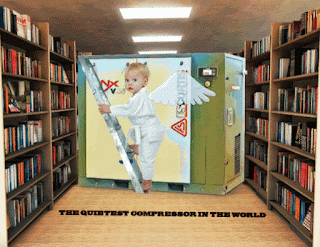WWW.HKAIRCOMPRESSORS.COM
 |
AIR COMPRESSOR SAFETY TIPS
WWW.HKAIRCOMPRESSORS.COM
214-428-2868 |
Air Compressor Safety Tips: Protecting People and Equipment
Air compressors are indispensable tools in various industries, from manufacturing and construction to automotive and home use. While they offer significant convenience and efficiency, air compressors also come with potential hazards. Ensuring safe operation is critical to protecting both people and equipment. This essay outlines essential safety tips for using air compressors effectively and safely.
 |
AIR COMPRESSOR SAFETY TIPS
WWW.HKAIRCOMPRESSORS.COM
214-428-2868 |
1. Understand the Equipment
Before using an air compressor, familiarize yourself with its user manual. The manual provides detailed instructions on the compressor’s operation, maintenance, and safety precautions. Each compressor model may have unique features or requirements, and understanding them is vital to safe operation.
2. Conduct Regular Inspections
Routine inspections are crucial for identifying potential issues before they become hazards. Check for visible damage, such as cracked hoses, loose fittings, or worn-out components. Inspect the pressure relief valve to ensure it functions correctly, as it prevents over-pressurization, which could lead to dangerous explosions.
 |
AIR COMPRESSOR SAFETY TIPS
WWW.HKAIRCOMPRESSORS.COM
214-428-2868 |
3. Use Appropriate Safety Gear
Always wear proper personal protective equipment (PPE) when operating an air compressor. This includes safety goggles to protect your eyes from flying debris, ear protection to guard against high noise levels, and gloves to handle hot or sharp components safely.
4. Monitor Pressure Levels
Operating an air compressor beyond its maximum pressure limit is a common and dangerous mistake. Over-pressurization can lead to hose bursts or equipment failure. Use a pressure gauge to monitor the system and ensure the pressure remains within the manufacturer’s recommended range.
.jpg) |
AIR COMPRESSOR SAFETY TIPS
WWW.HKAIRCOMPRESSORS.COM
214-428-2868 |
5. Secure Connections Properly
Loose or improperly connected hoses and fittings can detach under high pressure, causing injuries or damage. Always ensure that all connections are secure before starting the compressor. Quick-connect couplings should lock into place firmly to prevent accidental disconnections.
6. Ventilate the Workspace
Air compressors generate heat and may release fumes, particularly in enclosed spaces. Ensure adequate ventilation in your workspace to prevent overheating and the accumulation of toxic gases. If the compressor uses fuel, such as gasoline or diesel, proper ventilation is even more critical to avoid carbon monoxide buildup.
 |
AIR COMPRESSOR SAFETY TIPS
WWW.HKAIRCOMPRESSORS.COM |
7. Avoid Overloading Electrical Systems
When using electric air compressors, ensure the power source can handle the load. Overloading electrical circuits can cause fires or damage to the compressor. Use grounded outlets and avoid using extension cords, as they can reduce power supply efficiency and pose tripping hazards.
8. Practice Proper Hose Management
Air hoses can be tripping hazards if left tangled or stretched across walkways. Keep hoses organized and out of high-traffic areas. Avoid bending or kinking hoses, as this can weaken them and lead to bursts.
 |
AIR COMPRESSOR SAFETY TIPS
WWW.HKAIRCOMPRESSORS.COM
214-428-2868 |
9. Shut Down Safely
Always turn off the compressor and release any remaining pressure in the tank before performing maintenance or moving the equipment. This minimizes the risk of sudden pressure releases, which can cause injuries.
10. Train Users Thoroughly
Ensure that everyone operating the air compressor has proper training. Understanding how to use the equipment safely and respond to emergencies is essential in preventing accidents.
Conclusion
Air compressors are powerful tools that can enhance productivity when used correctly. By following these safety tips—ranging from proper maintenance and inspection to using appropriate safety gear and training—operators can minimize risks and create a safer working environment. Prioritizing safety not only protects people but also extends the lifespan of the equipment, ensuring efficient and reliable operation.
Differences Between Standard Piston Air Compressors and Rotary Screw Air Compressors
Piston Air Compressors (Reciprocating Compressors)
Design and Operation:
- Piston air compressors use a cylinder and piston mechanism to compress air. The piston moves up and down within the cylinder to draw in and compress air.
- These compressors generally operate in a start-stop mode, meaning they cycle on and off as air demand fluctuates.
Key Features:
- Intermittent Duty: Best suited for applications requiring short bursts of air, such as inflating tires or powering pneumatic tools in small workshops.
- Noise and Vibration: Tend to be noisier and produce more vibration due to their reciprocating motion.
- Maintenance: Require regular maintenance, including replacing belts, pistons, and valves, to ensure longevity.
- Efficiency: Less energy-efficient compared to rotary screw compressors, especially during extended or continuous use.
Rotary Screw Air Compressors
Design and Operation:
- Use two interlocking helical rotors to compress air. The rotors continuously rotate, drawing in air and compressing it without the need for pistons.
- These compressors are designed for continuous operation and handle larger volumes of air efficiently.
Key Features:
- Continuous Duty: Ideal for industrial applications requiring a consistent and steady air supply.
- Quiet and Smooth: Operate more quietly and smoothly, making them suitable for indoor environments.
- Low Maintenance: Fewer moving parts result in reduced maintenance needs and lower wear and tear.
- Energy Efficiency: More energy-efficient, particularly when equipped with Variable Speed Drive (VSD) technology that adjusts motor speed to match air demand.
Are Air Compressors Energy Efficient?
The energy efficiency of an air compressor depends on its type, technology, and application. Rotary screw compressors, especially those with VSD, are significantly more efficient than piston compressors because they reduce energy waste during part-load operations.
However, energy efficiency also depends on proper system design, maintenance, and air demand management. Leaks, improper sizing, and lack of maintenance can reduce overall efficiency and increase operating costs.
Can Air Compressors Save You Money?
Yes, air compressors can save you money, particularly when you invest in energy-efficient models and maintain them well. Here’s how:
Reduced Energy Costs:
- Energy-efficient compressors, like rotary screw models with VSD, consume less power, leading to significant savings on electricity bills.
- Heat recovery systems in some compressors allow you to reuse heat generated during operation for other processes, further reducing energy expenses.
Increased Productivity:
- High-quality air compressors ensure consistent performance, reducing downtime and improving operational efficiency.
- Faster and more precise tools powered by compressors can increase productivity, saving labor costs.
Lower Maintenance and Repair Costs:
- Advanced compressors require less frequent maintenance, reducing ongoing costs.
- Properly maintained systems also have longer lifespans, avoiding premature replacement expenses.
Customizable Output:
- Compressors with adjustable output match air supply to demand, reducing energy waste.
Conclusion
While standard piston air compressors are ideal for small, intermittent tasks, rotary screw compressors are the better choice for continuous, high-volume operations and energy efficiency. Investing in an energy-efficient air compressor can reduce operating costs, enhance productivity, and provide long-term financial savings. Proper maintenance and thoughtful system design are essential to maximize these benefits.












.JPG)












.jpg)





.JPG)